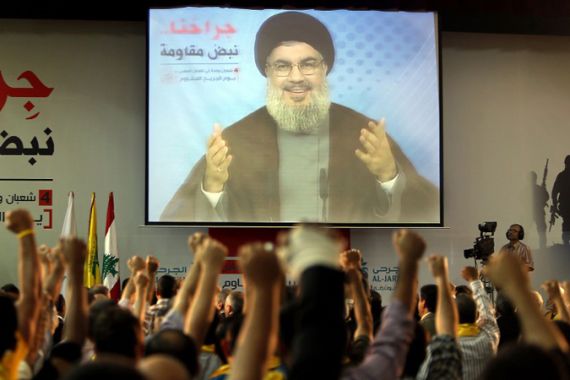Lebanon asks EU not to blacklist Hezbollah
Presidency calls Shia group “an essential part of Lebanese society” and urges EU to keep its armed wing off terror list.

Lebanon has asked the European Union not to add Hezbollah to its blacklist of terrorist organisations, calling the group an “essential component of Lebanese society”.
The request came on Thursday, as EU foreign ministers prepared to discuss whether to add the armed wing of Hezbollah to their list of terrorist groups.
A Lebanese presidency statement said it had “asked the foreign minister to notify the European Commission and member states of the government’s request, and not to place Hezbollah, an essential component of Lebanese society, on the list of terror organisations”.
It asked that “any decision not be taken in a precipitate manner, and without being based on objective and irrefutable proof”.
Diplomatic sources said foreign ministers were set to decide on Monday whether or not to blacklist the military wing of Hezbollah.
“There are still some reservations… but we are moving towards a decision on listing Hezbollah’s military wing,” a senior EU official said ahead ofthe scheduled meeting.
The move was justified by Hezbollah’s involvement in an attack against Israeli tourists in Bulgaria last year and its activities in Cyprus, the official said, but would “not impact current EU policy and engagement with Lebanon.”
The Shia Muslim movement has a strong presence in the current government of Lebanon, which is set for parliamentary elections in 2014.
Bulgaria attack
Lebanon’s request coincided with the first anniversary of a deadly attack on an Israeli tourist bus at a Black Sea resort in Bulgaria, which has called for sanctions against Hezbollah, accused by Israel and a number of its allies of being behind the bombing.
On July 18, 2012 five Israeli tourists and the Bulgarian driver of their bus were killed in a bombing at Burgas airport in the deadliest attack on Israelis abroad since 2004.
After the attack Israel immediately blamed Iran, which denied the accusation, and its “terrorist proxy” Hezbollah for the bombing.
A year later, investigators are increasingly frustrated in their efforts to track down those responsible.
Both the United States and Israel have long demanded that the EU list Hezbollah as a terrorist group.
But despite strong pressure to follow their example, the EU had until last month skirted an issue seen as sensitive and divisive, with Britain openly in favour but France reluctant.
Britain asked for the group to be put on the terror list in May, citing evidence it was behind the bus bombing in Bulgaria.
France says the reversal in its policy is due to Hezbollah’s perceived role in the Syrian conflict.
“Because of the decisions that have been taken by Hezbollah and the fact that they are fighting very harshly the Syrian population, we have decided to ask that the military branch of the Hezbollah would be considered as a terrorist organisation,” France’s foreign minister Laurent Fabius told reporters.
A decision to blacklist Hezbollah would stress that the EU is open to talking to the Lebanese movement’s political faction.
But unanimity is needed for any decision and Austria, the Czech Republic and Ireland are among EU governments that have voiced reservations in the past.
The EU’s lists of terrorist persons or organisations have raised fundamental rights questions and have been challenged before the European Courts.